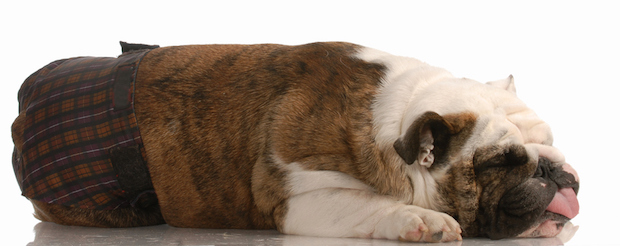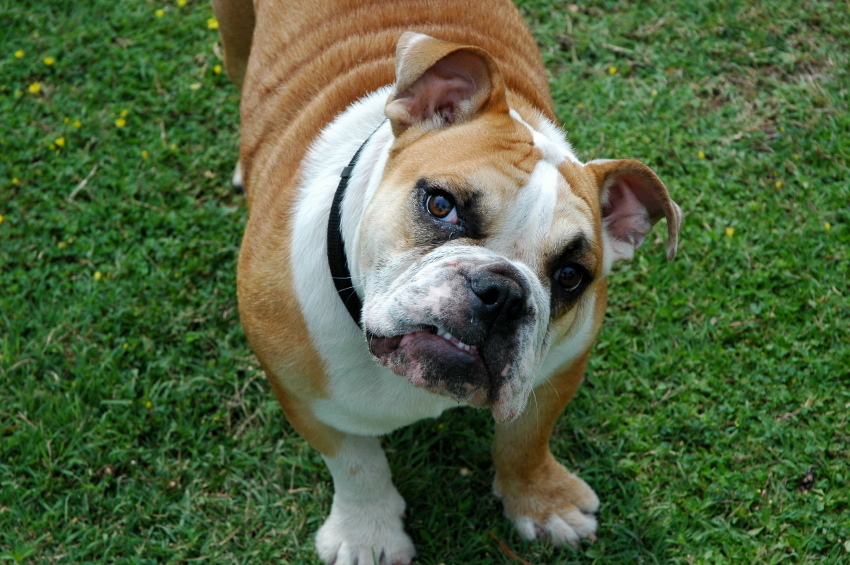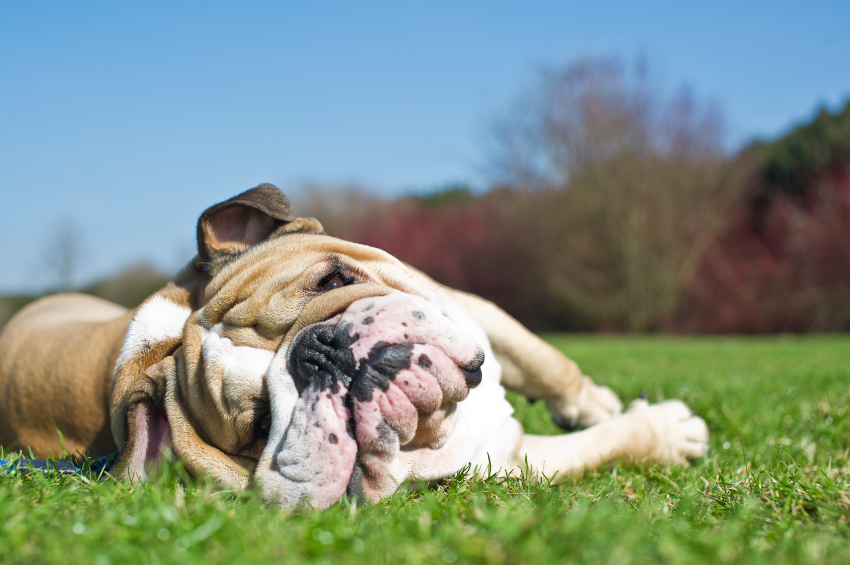Bloating in Bulldogs is a serious and often becomes a fatal disease that can happen in dogs irrespective of any age. Known as Gastric Dilatation-Volvulus (GDV) in medical annals, Bloat can be painful for your pet and easily kill him in a few hours. Also referred to as gastric torsion, twisted stomach, or stomach torsion, it is the second most common cause of death in senior dogs after cancer.

What happens when there is bloating in Bulldogs?
Gastric Dilatation-Volvulus has 2 stages. The first one is called gastric dilation, where there is gas build-up in your Bulldog’s stomach causing it to expand or bloat. When this happens, organs surrounding the stomach, including the heart and the diaphragm are pressed – causing blood circulation problems. The second stage is called the volvulus. This occurs when the stomach twists and rotates up to 360° – trapping air, food, and water in it.
Not all gastric dilatations progress to volvulus. However, if the disease advances to the second stage, the caudal vena cava – the large vein that returns blood to heart – becomes suppressed. This can cause your Bulldog to experience low blood pressure, shock, and internal organ damage leading to death within hours.
What are the signs of bloating in Bulldogs?
During the first stage (gastric dilatation) your Bulldog may show any of the following signs.
- Unusual tummy enlargement (as if it is distended to the sides)
- Unsuccessful attempts to vomit
- Sudden depression or lethargy
- Pale gums
- Excessive salivation
- Sudden collapse
- Drooling
- Anxiety
- Feeling uneasy
- Aggression when the belly is touched
As the disease enters the volvulus stage, your Bulldog may have:
- rapid heart rate
- shortness of breath
- collapse
- loss of consciousness
- purplish gums
How to treat bloating in Bulldogs
Time is crucial when treating the incidence of bloating in Bulldogs. Early treatment makes a difference between life and death for them. About 25 to 33% of dogs diagnosed with the disease still die even with treatment. Some symptoms of this disorder are similar to other diseases. So, if bloat is suspected, the vet performs some quick tests to confirm or rule it out. Procedures may also include radiographs (x-rays) and lactate test.
Radiographs help determine if the stomach has already been twisted, while the lactate test is performed to check if there is already necrosis or cell death in the stomach or surrounding organs. The damage done by bloating is often irreparable if necrosis has already begun. If the vet determines that your Bulldog has a high chance of survival, treatment is immediately started.
- Letting the gas out
While treating bloating in Bulldogs, it is necessary to remove the trapped gas. If the disease is at the first stage, a feeding tube is inserted down to your Bulldog’s stomach helping the gas to pass through the mouth and esophagus. But if the stomach has already twisted, the vet may opt to puncture the abdominal and stomach wall to let the trapped gas out.
- Surgery
If the disease reaches the volvulus stage, the stomach has to be returned to its original position even if the gas has already been out. To do this, the vet will untwist the stomach via surgery. Many surgeons recommend performing a gastropexy, an operation that refers to the suturing of stomach to the body wall, after the stomach is arranged back to its original position. This surgical operation prevents the stomach from twisting again.
How to prevent bloating in Bulldogs?
There is not a surefire way to stop bloating in Bulldogs from happening. However, there are a few things that you can do to reduce the risk of bloat in your pet.
- Feed your Bulldog smaller meals spanned throughout the day instead of giving him one large meal per day.
- Feed him using a slow-feeder to stop him from eating too fast and gulping air in the process.
- Do not feed your Bulldog dry kibble with water as dry dog food tends to expand in the stomach.
- Do not let your Bulldog drink too much water after eating.
- Make your Bulldog rest for a couple of hours after eating before letting him to play.
- Mix crunchy food into your Bulldog’s food to encourage more chewing. It slows him down while eating.
- Use gastric medication in your first aid kit and use it as soon as you see the early signs of bloating in your Bulldog. But make sure to call your veterinarian first before giving your Bulldog any medication.

